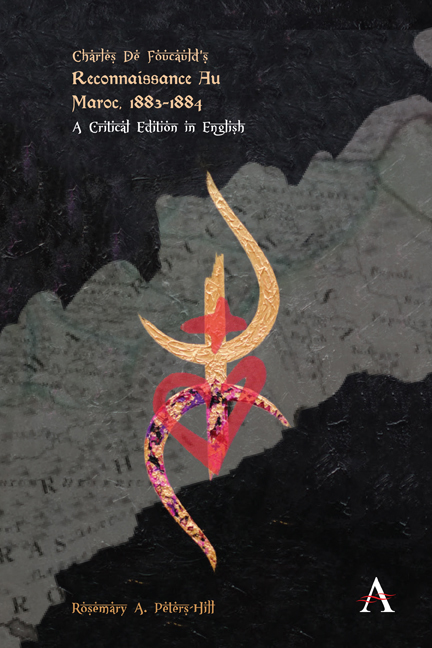Book contents
- Frontmatter
- Contents
- List of Figures
- Acknowledgments
- “There are no roads”: Charles de Foucauld’s Reconnaissance au Maroc—a Critical Introduction
- Charles de Foucauld, Reconnaissance au Maroc, 1883–1884
- Letter to François de Bondy
- Introduction
- Avant-Propos
- I Tangiers to Meknès
- II Meknès to Qaçba Beni Mellal
- III Qaçba Beni Mellal to Tikirt
- IV Tikirt to Tissint
- V Sojourn in the Sahara
- VI Tissint to Mogador
- VII Mogador to Tissint
- VIII Tissint to the Dadès
- IX The Dadès to Qçabi ech Cheurfa
- X Qçabi ech Chorfa to Lalla Maghnia
- Appendix: The Jews of Morocco
- Note on the Materials Used to Draw Up My Itinerary
- Report Delivered to the Société de Géographie de Paris in Its General Session of 24 April 1885
- “Itineraries in Morocco”
- Afterwards: An Afterword
- Glossary of Terms
- Bibliography
- Index
I - Tangiers to Meknès
Published online by Cambridge University Press: 20 January 2022
- Frontmatter
- Contents
- List of Figures
- Acknowledgments
- “There are no roads”: Charles de Foucauld’s Reconnaissance au Maroc—a Critical Introduction
- Charles de Foucauld, Reconnaissance au Maroc, 1883–1884
- Letter to François de Bondy
- Introduction
- Avant-Propos
- I Tangiers to Meknès
- II Meknès to Qaçba Beni Mellal
- III Qaçba Beni Mellal to Tikirt
- IV Tikirt to Tissint
- V Sojourn in the Sahara
- VI Tissint to Mogador
- VII Mogador to Tissint
- VIII Tissint to the Dadès
- IX The Dadès to Qçabi ech Cheurfa
- X Qçabi ech Chorfa to Lalla Maghnia
- Appendix: The Jews of Morocco
- Note on the Materials Used to Draw Up My Itinerary
- Report Delivered to the Société de Géographie de Paris in Its General Session of 24 April 1885
- “Itineraries in Morocco”
- Afterwards: An Afterword
- Glossary of Terms
- Bibliography
- Index
Summary
Tangiers to Tetuan
I disembarked in Tangiers on the 20th of June 1883, accompanied by Rabbi Mardochée. Having nothing new to see in this city, known through its many descriptions, I was eager to leave. My first stop was to be Tétouan, and I sought information immediately on the best means of getting there. It was a day's walk away; small caravans left daily from Tangiers; the road was safe; I would not need an escort. I fixed my departure for the following day.
Despite the short time I spent in Tangiers, the minister of France, M. Ordéga—to whom M. Tirman, governor general of Algeria, had kindly recommended me—prepared letters of introduction to his agents for me, with an unparalleled goodwill and graciousness; he gave me one from Moulay Abd es Selam, the renowned sherif of Ouezzane, commanding whomever was his friend to lend me help and protection; in short, furnished me with all the recommendations that I could need in the course of my journey. There was not a one that did not serve me well in the months that followed; thus I thought back, more than once, with gratitude on the generosity of which I had been the object.
21 June 1883
I leave Tangiers at three o’clock in the afternoon. My caravan consists of six or seven men, most of them Israelites, and ten or so beasts of burden. We first cross a series of small, wellcultivated valleys, separate from each other by borders of dwarf palms. Toward evening, we enter the valley of the Oued Merah; this is where we walk for the rest of the day, amid superb fields of wheat that cover the valley entirely. We stop at nine-fifteen near some hutlike shelters, and spend the night in this place. The road, safe by daylight, ceases to be so after dusk. This is the moment when marauders begin their campaigns. And I saw, by the setting sun, mounted sentries, armed to the teeth, stationed at the village gates, near the flocks, on little buttes from which they could survey the crops.
- Type
- Chapter
- Information
- Charles de Foucauld’s Reconnaissance au Maroc, 1883–1884A Critical Edition in English, pp. 101 - 150Publisher: Anthem PressPrint publication year: 2020



